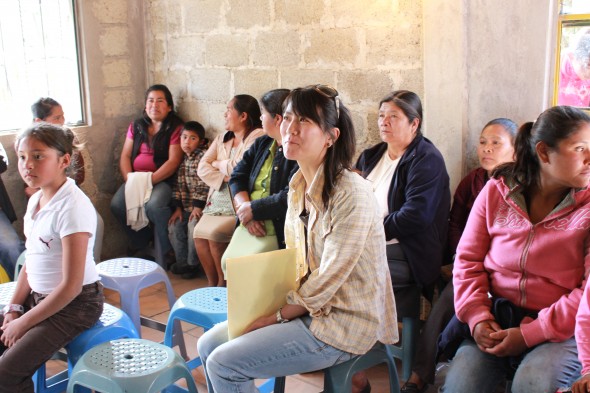It all comes down to the cereal aisle. That's where Yoshi's passion for sustainable agriculture was first sparked, and over the course of her travels and work experiences, it has brought her all the way to Mexico, where she works with coffee-producing families and communities. Yoshi's job at Coffee Kids allows her to pursue other passions, like art, which makes it a true pursuit of happiness, as we define it.
When did you know that you wanted to work in food?
During university, I was browsing the cereal aisle of a Safeway supermarket and realized how much the colorful boxes were seducing me to buy them. Then I started to think about all the garbage the packaging produces in a year. At the time, I didn't feel like I could change the world overnight, but I knew that I had power as a consumer to choose and buy things that are local, good quality, and benefit something that I find meaningful. That year I studied abroad in New Zealand and traveled by WWOOFing (Willing Workers On Organic Farms), where I worked a few hours on organic farms in exchange for meals and a place to stay. Through this program, I realized my strong interest in sustainable agriculture.
How did you get your current good food job?
I met my coworker at a party and became friends with her. A few months later, she posted online that Coffee Kids was hiring an international program coordinator in their office in Oaxaca, Mexico. Coffee Kids is a nonprofit development organization dedicated to helping coffee-farming families and communities determine their own vision of the future. I have been living in Mexico for 2.5 years teaching English and earning a living as an artist. Most artists need to economically diversify to survive, and Coffee Kids encourages their partner organizations that rely heavily on coffee production to do just that. The organization also focuses on food security, capacity building, health care and education-all areas that I find interesting and worthwhile.
How did your previous work or life experience prepare you for a good food job?
After university, I traveled and volunteered on different farms in many countries. I've worked on farms near Seattle, where I lived for 10 years, and worked with a farmers market nonprofit organization. I also taught children nutrition and organic vegetable gardening and had my own landscaping business in Seattle. My hobby there was vegetable gardening when I had a community garden plot, but here in Mexico, I only have rosemary growing in a pot. Cooking is another hobby, and I enjoy shopping at a nearby market and also teaching locals to make Japanese cuisine.
Through my experience, I've learned about food security and sustainable agriculture, but most importantly, I learned that interaction with people in this field is what matters most.
What was the greatest obstacle you had to overcome in pursuing your Good Food Job dream?
My dream was to live a simple life on a farm in the countryside, growing and eating my own food, selling the surplus, making art on the side, and also to have an eco-friendly lodge where travelers could also enjoy this lifestyle. I researched a business plan with a friend to pursue this dream together, but we found out that money is the greatest obstacle. We called it quits, but there's still hope that one day I can fulfill this dream. The money I saved for the dream farm went toward my new life in Mexico, which is a great alternative, and I'm still involved with a good food job through my work with Coffee Kids.
What can you identify as the greatest opportunities in food right now?
Food security, food sovereignty and sustainable agriculture are all catching on in developed countries, especially in the more progressive cities. The upper and middle classes are more educated on these issues and have a choice as to what they want to consume. But I hope that it will catch on more in the developing world as well, and that all classes and cultures will have the knowledge and choice to consume responsibly. I see firsthand here in Mexico and among the organizations that I work with in Latin America that the wheels are turning and, little by little, grassroots projects and traditional, sustainable agricultural techniques are being revived in the communities.
If you could be compensated for your work with something other than money, what would it be?
Human necessities like food, water, shelter, utilities, etc., but also things that I enjoy and make me happy like art, handmade quality goods, traveling, and services like a professional massage.









